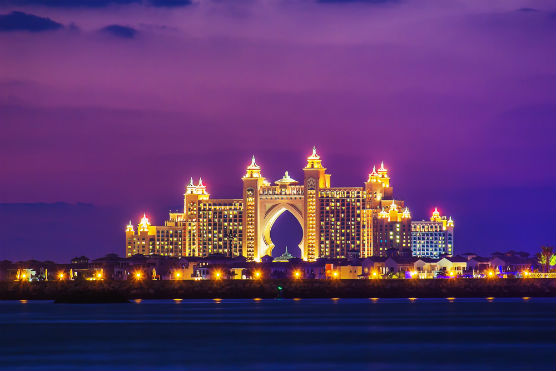
For first time visitors to Dubai, it's the big things that often get the most attention, possibly because there are so many of them. Dubai is home to the tallest tower in the world (the Burj Khalifa), the tallest hotel (the Burj Al Arab), the largest man-made marina, and the largest man-made island (the Palm Jumeirah), just for starters.
But beyond the headline attractions, Dubai also reveals itself as a complex, intriguing city with a surprising amount of history, and, away from the attention-grabbing headliners, some fantastic sights such as Dubai Creek.
The creek is Old Dubai's geographic centre, and is still a working waterway with dozens of traditional dhow ships loading and unloading their cargoes on the creekside. Towards the mouth of the creek both shores are lined with Dubai's souks (markets), offering a flavour of a time before malls.
During the cooler months, a stroll along the creek will take you past not only the souks, but also areas such as Bastakiya, one of the oldest parts of Dubai. Abras – small wooden boats – cross the water regularly, and at AED1 each way are worth a trip even if you don't need to go to the other side.
By far the best time to see the creek is just before sunset. Start your walk lower down and head towards the sea. As the sun goes down the muezzins of the mosques either side of the creek make their calls to prayer, echoing off the buildings on both sides of the water, and combining with the fading sun and the lights of the boats to create a remarkable effect.
Top

Dubai: city of Blues and secret agents
With year-round sun and the calm Gulf waters lapping its shores, Dubai is an excellent place to relax. The city has more five-star hotels than four-star, and many of them are situated on the shore, offering direct beach access.
Even if you aren't staying at them, a number of hotels offer day access to their beach and pool for a fee, or as a complimentary extra if you dine there. Hotels away from the sand also have a lot to offer, between high-rise bars and restaurants, spas, or just fantastic service.
Out of the city, those in search of Dubai's wilder side can head out to Al Maha, Emirates luxury desert resort, set in an extensive nature reserve.
Top

Dubai loves to shop, to the point where it even has a festival dedicated to the art of consuming, in the shape of the Dubai Shopping Festival. And where Dubai shops, it also relaxes – at the mall.
The city is home to some of the world's largest malls, including the Dubai Mall, which features an aquarium and ice rink and sits in the shadow of the Burj Khalifa, the tallest building in the world. Dubai's other mega-mall is Mall of the Emirates, home of the now-famous indoor ski slope.
Away from the malls, you can get a taste of more traditional Arabian shopping – and a much more varied snapshot of life – at Dubai's souks. Located around the creek, these traditional markets are open to the air, and usually come to life in the evenings. Look out for the Old Souk on the Bur Dubai side of the Creek, then catch an abra across the water to see Deira's markets, including the Gold Souk.
Top

With its comprehensively international population, Dubai can offer almost any style of food you want, and at almost any price, from cheap street-food to pricey gourmet cuisine.
As in the rest of the Middle East, Dubai's traditional dish is the shawarma – a Lebanese-style kebab of grilled meat wrapped in a fresh flatbread.
But alongside the traditional shawarma joints now sit many international fast food brands and international chains. There are still plenty of independent restaurants scattered over Dubai, though, and while the surroundings of many may be less than glamorous, the food can often be superb – try Smiling BKK in the back streets of Satwa for excellent Thai food, for example.
The majority of the more upmarket restaurants are in Dubai's hotels, which means they are licenced to serve alcohol. In recent years the worldwide trend for restaurants to sign up celebrity chefs has made its way to Dubai, and you can currently find offerings from Gordon Ramsay, Marco Pierre White and Gary Rhodes across the city – along with a clutch of big-name chefs lending their names to restaurants in Atlantis, The Palm.
Top
Dubai's many hotels offer a vast range of bars and nightspots, from places for a casual drink, to locations offering stunning vistas, to full-blown nightclubs.
Increasing numbers of international bands and DJs are adding Dubai to their touring schedules, and most months will see at least one big-name gig in town – check out local listings magazines for the most up-to-date information, and for tips on the city's current hottest nightspots.
Top
Dubai is a perfect jumping-off point to explore the UAE as a whole. A good place to start is the desert, with a number of operators offering a range of desert safaris, from sunset dune-bashing excursions to full-day trips to the mountains.
Two hours' drive south-west of Dubai is Abu Dhabi, the capital of the UAE. Now in the full throes of its own massive development programme, Abu Dhabi is now home to its own set of world-class amenities, including the Yas Marina F1 Grand Prix circuit, which sees the international racing competition come to town each November.
Bordering Dubai to the north-east is the emirate of Sharjah, more conservative than Dubai, but with a growing number of cultural activities, including a thriving arts scene.
On the east coast of the UAE, overlooking the Indian Ocean, is Fujairah. Quieter than the emirates of the west coast, Fujairah is known for its spectacular scuba-diving, and is home to a number of luxury hotels.
Top

